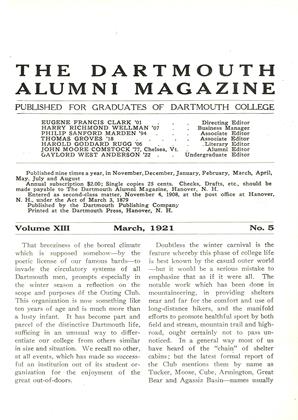SINCE THE CIVIL WAR. Charles Ramsdell Lingley, Professor of History, Dartmouth College. Century Comany 1920.
This volume is the third of a series covering the political and economic history of the United States, edited by Professor Max Farrand of Yale University; and is the first to appear. Beginning with the period of reconstruction it. brings the story down to the failure of the Senate to ratify the peace treaty in 1920.
Dr. Crothers has told us that the first requirement which the general reader makes upon the historian is that he shall tell the story, and the second that he shall tell it in an interesting fashion. Deductions, comparisons, inferences may then follow, but the work is a failure if the first two requirements are not met. Professor Lingley in the present work has been eminently successful in telling the story of the last fifty years in a manner which holds the attention of the reader through the greater portion of the book. The narrative flows smoothly, the humorous is not disdained, events, trivial in themselves, but which illuminate the general trend of the times, contribute to the completeness of the story. The result is in marked contrast with those uninspired productions, the favorites of certain classes of historians, measured by which history would seem to deserve the title of the dismal science, so improperly applied to economics.
The biographical path to history is that most easily traveled by the general reader. In the period under discussion picturesque or outstanding personalities, such as Grant, Conklin, Blaine, Cleveland, Reed, Hanna, Bryan, Roosevelt and Wilson are numerous, but almost equally prominent, and in many cases as useful, are men of less popular appeal ; men of the type of Hayes, Harrison, McKinley and Taft. The opportunity for study of these contrasting types is fully embraced by the author. Discriminating analyses of the personalities and characters of the leading men of the period, brief and apparently unstudied and spontaneous, but really involving much labor in investigation and comparison, make up perhaps the most attractive single feature of the book.
It should not be inferred that the interest of the book is at the expense of its scholarly character. It is not a "popular text in the bad sense of the word. The author has succeeded to a remarkable degree in dissociating himself and his opinions from the issues which he is describing. He has selected judiciously and stated accurately the facts, and has formed judgments upon them only when such judgments are warranted by an unquestioned preponderance of evidence. If the result constitutes an indictment of politicians and of political parties through a considerable portion of the period, the effect is the greater through the restraint with which such conclusions are inferred rather than stated.
Designed as it is for use both as a text book and for the general reader certain difficulties of arrangement are encountered. In the main the order is chronological, but at frequent intervals chapters relating to special topics and forming cross sections of the period are inserted. While skillfully carried out this process involves certain breaks in the continuity of the story, although for student use such topical treatment has obvious advantages. It seems unfortunate, from the point of view of the work as a whole, that the story should not have ended at an earlier period. The events of the last few years, while too remote for news, are too recent for history, and the chapters covering them are, of necessity, somewhat perfunctory in comparison with their predecessors.
Professor Lingley's book can be recommended without reservation to all interested in present-day economic and political problems. The individual who has lived through the greater portion of the period is likely still to retain the impression produced by the incomplete evidence of the times themselves; by the frenzy of political campaigns, by the prejudice engendered by partisan discussion. Nor is the younger citizen, if he takes his political background from his environment, likely to be in a better situation. A careful perusal of this text and the drawing of rigorous deductions from the facts there given will help much in enabling the individual to come to a reasonable decision upon the controverted questions of the day. And it is particularly worth while, at the present time, when a period of idealism is in danger of being replaced by something quite different, to have before us in clear form the story of the twenty years of dingy politics and struggle for partisan advantage which succeeded a similar period of idealism ending in 1865.
 View Full Issue
View Full Issue
More From This Issue
-
 Article
ArticleCHARLES DOE, 1849
March 1921 By JUDGE JOHN ELIOT ALLEN '94 -
 Article
ArticleA REPORT TO THE ALUMNI
March 1921 By JAMES P. RICHARDSON -
 Article
ArticleThat breeziness of the boreal climate
March 1921 -
 Sports
SportsBASKETBALL
March 1921 -
 Article
ArticleWEBSTER LETTER PROPHESIED TELEPHONE AND TELEGRAPH
March 1921 -
 Books
BooksPUBLICATIONS
March 1921
Books
-
 Books
BooksAlbert W. Levi '32, is the author
December 1933 -
 Books
BooksMOSTLY MAMA.
JUNE 1972 By EDWARD M. POTOKER '53 -
 Books
BooksECONOMIC PRINCIPLES IN PRACTICE
June 1939 By G. W. Woodworth -
 Books
BooksMEDICO SURGICAL ARMAMENTARIUM — MSA.
JULY 1963 By HARRY W. SAVAGE '26, M.D. -
 Books
BooksAMERICAN SCHOOLS, A CRITICAL STUDY OF OUR SCHOOL SYSTEM,
October 1943 By Louis P. Benezet '99 -
 Books
BooksDizzying Truths
September 1978 By WALTER W. ARNDT


